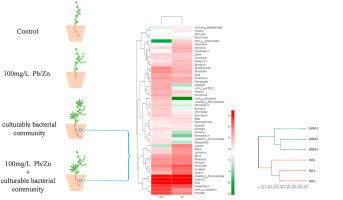Rhizosphere ( IF 3.4 ) Pub Date : 2021-07-07 , DOI: 10.1016/j.rhisph.2021.100406 Xue Li 1 , Chongling Feng 2 , Lin Chen 1 , Fang Liu 1 , Lingyu Wang 1 , Kun Luo 1 , Ya Pang 1

|
Culturable bacteria are widely used in the remediation of heavy metal-contaminated soil associated with different plants. In this study, a pot experiment of castor bean (Ricinus communis L.) was performed to determine the effect of culturable bacterial communities on the growth of castor bean, as well as their response to the presence of Pb and Zn during the 21-day incubation. The results indicated that the inoculation of the cultivable bacterial communities promoted plant growth, whether Pb/Zn-contaminated or not, and a well-developed root system was also detected in the bacterial community after treatment. Under heavy metal stress, the root surface area of castor bean decreased significantly, but after inoculation, it was close to the level of the normal (uncontaminated) samples. Sequence analysis at the phylum and genus taxonomic levels illustrated 13 identified phyla and 125 genera were observed in the control and Pb/Zn-contaminated soil. The input of contaminants affected the bacterial community structure, suggesting that although Proteobacteria, Bacteroidetes, and Actinobacteria were the dominant phyla in the two samples, the Ensifer and Cupriavidus genera were decreased in contaminated soil. However, Arcticibacter, a phosphate-solubilizing bacterium, was enriched by the Pb/Zn treatment. Compared with the control group, Pb and Zn exposure in the treatment group resulted in a new community structure. A microflora consisting of a number of microorganisms undergoing a long duration period of adaptation and symbiosis can possess systematic functions with high stabilities, so it has considerably high potential in intensifying the effect of phytoremediation.
中文翻译:

可培养的根际细菌改善了 Pb-Zn 处理土壤中蓖麻幼苗的根系和植物生长
可培养细菌广泛用于修复与不同植物相关的重金属污染土壤。本研究对蓖麻 ( Ricinus community)进行盆栽试验L.) 用于确定可培养细菌群落对蓖麻子生长的影响,以及它们在 21 天孵化期间对 Pb 和 Zn 存在的反应。结果表明,接种可培养细菌群落促进了植物生长,无论是否受到 Pb/Zn 污染,并且在处理后的细菌群落中也检测到发育良好的根系。在重金属胁迫下,蓖麻根表面积显着下降,但接种后接近正常(未受污染)样品的水平。在门和属分类水平上的序列分析表明,在对照和 Pb/Zn 污染的土壤中观察到 13 个已鉴定的门和 125 个属。污染物的输入影响了细菌群落结构,Ensifer和Cupriavidus属在污染土壤中减少。然而,Pb/Zn 处理富集了一种溶解磷酸盐的细菌北极杆菌。与对照组相比,处理组铅、锌暴露导致了新的群落结构。由多种微生物长期适应共生组成的菌群,具有系统功能和稳定性高的特点,因此在加强植物修复效果方面具有相当大的潜力。 ? ? ? ? ? ? ? ? ? ? ? ? ? ? ? ? ? ? ? ? ? ? ? ? ? ? ? ? ? ? ? ? ? ? ? ? ? ? ? ? ? ?







































 京公网安备 11010802027423号
京公网安备 11010802027423号